This article needs additional citations for verification .(February 2014) |
Family Carers Ireland is a non-profit organisation based in Dublin, Leinster.
This article needs additional citations for verification .(February 2014) |
Family Carers Ireland is a non-profit organisation based in Dublin, Leinster.
It started as The Carers Association in 1987, [1] and was the first national carers association for lobbying government, [2] representing family carers and advocate for carers rights in Ireland. The national census of 2006 shows that there are 160,917 people who stated that they are carers and almost 41,000 of these carers are providing 43 or more hours of care each week. The association estimates that carers provide 194 million hours of care a year to the value of about 2.5 billion Euros to the economy. Approximately 33,000 full-time carers qualify for the Carers Allowance from the government. This Allowance is means tested. The government has committed to developing a National Carers Strategy by the middle of 2008. [3]
The Carers Association was the subject of a chapter-length study in Care Work: The Quest for Security. [4]
Caring For Carers Ireland was [5] a national care organisation in Ireland [6] that provided training on homecare and computer skills to family carers, as well as talks on the issues affecting family carers. [7]
In addition to assisting carers directly, it collaborated with other care organisations and academics [8] [9] in order to raise awareness of issues faced by carers, including by facilitating access to carers for interview, [6] and convening conferences of care organisations. [10] [11]
It was founded in County Clare, around 1988 [5] -1990, [12] by Soroptimists. [13] [14]
Its importance in social care in Ireland was acknowledged by multiple government ministers. [15] [16]
Around 2015–2016, it merged with The Carers Association [12] to form Family Carers Ireland. [5]

Fine Gael is a liberal-conservative and Christian-democratic political party in Ireland. Fine Gael is currently the third-largest party in the Republic of Ireland in terms of members of Dáil Éireann and largest in terms of Irish members of the European Parliament. The party had a membership of 25,000 in 2021. Simon Harris succeeded Leo Varadkar as party leader on 24 March 2024.
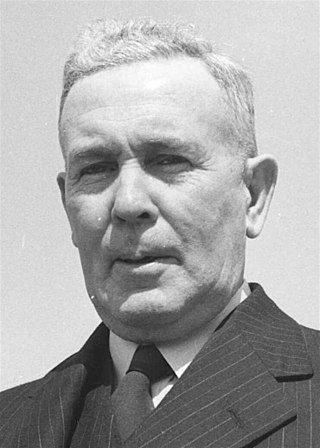
Joseph Benedict Chifley was an Australian politician and train driver who served as the 16th prime minister of Australia from 1945 to 1949. He held office as the leader of the Australian Labor Party (ALP), having previously served as the treasurer of Australia under Prime Minister John Curtin and later himself from 1941 to 1949. He was notable for defining Australia's post-war reconstruction efforts.
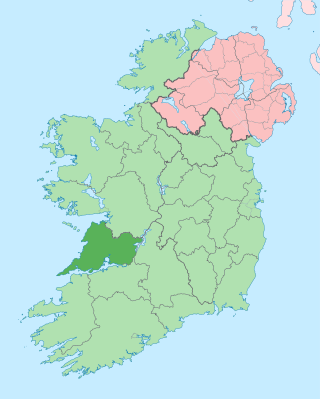
County Clare is a county in the province of Munster in the Southern part of the republic of Ireland, bordered on the west by the Atlantic Ocean. Clare County Council is the local authority. The county had a population of 127,938 at the 2022 census. The county seat and largest settlement is Ennis.

Brendan Corish was an Irish Labour Party politician who served as Tánaiste and Minister for Health from 1973 to 1977, Leader of the Labour Party, Minister for Social Welfare from 1954 to 1957 and from 1973 to 1977, Parliamentary Secretary to the Minister for Defence and Parliamentary Secretary to the Minister for Local Government from 1948 to 1951. He was a Teachta Dála (TD) from 1948 to 1982.

Ennis is the county town of County Clare, in the mid-west of Ireland. The town lies on the River Fergus, north of where the river widens and enters the Shannon Estuary. Ennis is the largest town in County Clare, with a population of 27,923, making it the 6th largest town, and 11th largest urban settlement, as of the 2022 census. Dating from the 12th century the town's Irish name is short for Irish: Inis Cluana Rámhfhada, meaning "Island of the long rowing meadow", deriving from its location between two courses of the River Fergus.

Michael Daniel Higgins is an Irish politician, poet, broadcaster and sociologist who has served as the ninth president of Ireland since 2011. Entering national politics through the Labour Party, he served as a senator from 1973 to 1977 having been nominated by the Taoiseach. Elected in 1981 as a Teachta Dála (TD), he represented the Galway West constituency from 1981 to 1982 and 1987 to 2011. Between these terms, he returned to Seanad Éireann from 1983 to 1987 as a senator for the National University. He served as minister for arts, culture and the Gaeltacht from 1993 to 1997 and mayor of Galway from 1981 to 1982 and 1990 to 1991. Higgins was the president of the Labour Party from 2003 to 2011, until he resigned following his election as president of Ireland.

Kilrush is a coastal town in County Clare, Ireland. It is also the name of a civil parish and an ecclesiastical parish in Roman Catholic Diocese of Killaloe. It is located near the mouth of the River Shannon in the south-west of the county. Kilrush is one of the listed Heritage Towns of Ireland. The area was officially classified as part of the West Clare Gaeltacht, an Irish-speaking community, until 1956.
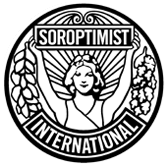
Soroptimist International (SI) was founded in 1921 as a global volunteer service for women with almost 66,000 members in 118 countries worldwide. Soroptimist International also offers Associate Membership and E-Clubs.

The Union of Students in Ireland (USI) is the national representative body for third-level students' unions in Ireland. Founded in 1959, USI represents more than 374,000 students in over forty colleges across the island of Ireland. Its mission is to work for rights of students and a fair and equal third level education system in Ireland.

Clement Attlee was invited by King George VI to form the Attlee ministry in the United Kingdom in July 1945, succeeding Winston Churchill as Prime Minister of the United Kingdom. The Labour Party had won a landslide victory at the 1945 general election, and went on to enact policies of what became known as the post-war consensus, including the establishment of the welfare state and the nationalisation of some industries. The government's spell in office was marked by post-war austerity measures, the violent crushing of pro-independence and communist movements in Malaya, the grant of independence to India, the engagement in the Cold War against Soviet Communism as well as the creation of the country's National Health Service (NHS).
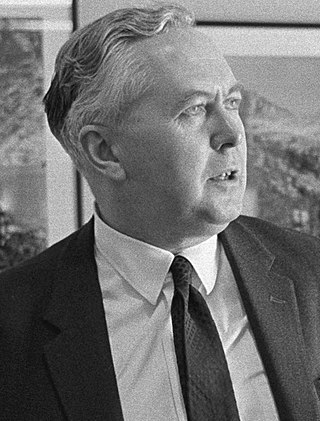
Harold Wilson was appointed Prime Minister of the United Kingdom by Queen Elizabeth II on 16 October 1964 and formed the first Wilson ministry, a Labour government, which held office with a thin majority between 1964 and 1966. In an attempt to gain a workable majority in the House of Commons, Wilson called a new election for 31 March 1966, after which he formed the second Wilson ministry, a government which held office for four years until 1970.
Respite care is planned or emergency temporary care provided to caregivers of a child or adult.

The Labour Party governed the United Kingdom of Great Britain and Northern Ireland from 1974 to 1979. During this period, Harold Wilson and James Callaghan were successively appointed as Prime Minister by Queen Elizabeth II. The end of the Callaghan ministry was presaged by the Winter of Discontent, a period of serious industrial discontent. This was followed by the election of Conservative leader Margaret Thatcher in 1979.
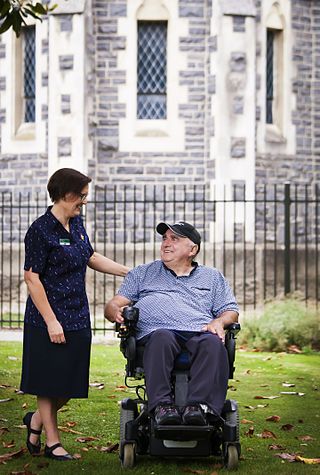
A caregiver, carer or support worker is a paid or unpaid person who helps an individual with activities of daily living. Caregivers who are members of a care recipient's family or social network, and who may have no specific professional training, are often described as informal caregivers. Caregivers most commonly assist with impairments related to old age, disability, a disease, or a mental disorder.
Carers' rights are rights of unpaid carers or caregivers to public recognition and assistance in preventing and alleviating problems arising from caring for relatives or friends with disabilities. The carers' rights movement draws attention to issues of low income, social exclusion, damage to mental and physical health identified by research into unpaid caregiving. In social policy and campaigning the movement distinguishes such people's situation from that of paid careworkers, who in most developed countries have the benefit of legal employment protection and rights at work. With an increasingly ageing population in all developed societies, the role of carer has been increasingly recognized as an important one, both functionally and economically. Many organizations which provide support for persons with disabilities have developed various forms of support for carers/caregivers as well.
Family caregivers are "relatives, friends, or neighbors who provide assistance related to an underlying physical or mental disability for at-home care delivery and assist in the activities of daily living (ADLs) who are unpaid and have no formal training to provide those services."
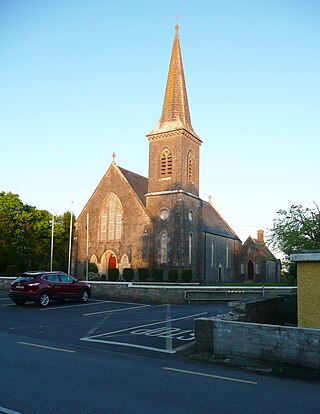
Clonlara, officially Cloonlara, is a village in County Clare, Ireland, and a Roman Catholic parish of the same name.
In the United States there are approximately 50 million people who are caring at home for family members including elderly parents, and spouses and children with disabilities and/or chronic illnesses. Without this home-care, most of these cared for would require permanent placement in institutions or health care facilities.
Caregiving by country is the regional variation of caregiving practices as distinguished among countries.
Disability in the United Kingdom covers a wide range of conditions and experiences, deeply impacting the lives of millions of people. Defined by the Equality Act 2010 as a physical or mental impairment with a substantial and long-term adverse effect on a person's ability to carry out normal day-to-day activities, it encompasses various aspects of life, including demographics, legislation, healthcare, employment, and culture. Despite numerous advancements in policy and social attitudes, individuals with disabilities often encounter unique challenges and disparities.
{{cite web}}: CS1 maint: multiple names: authors list (link) CS1 maint: numeric names: authors list (link){{cite web}}: CS1 maint: numeric names: authors list (link)